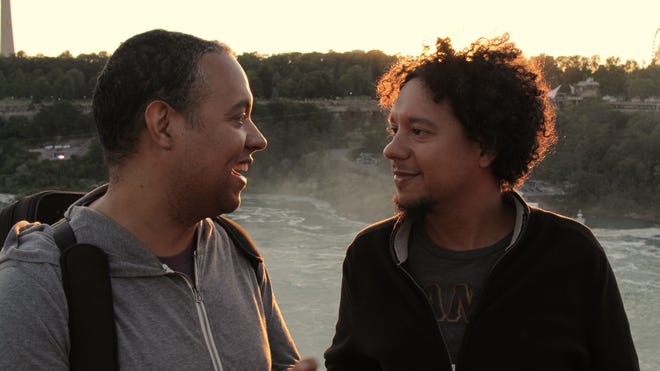Long-separated Cuban brothers, both virtuoso musicians, to reunite for concert in Pontiac
Duante Beddingfield for Detroit Free Press

The music of Cuba will be front and center at Pontiac’s Flagstar Strand Theatre Saturday when the Chamber Music Society of Detroit presents the Gavilán Brothers live in concert.
The Cuban-born virtuoso musicians, violinist Ilmar Gavilán and pianist Aldo López-Gavilán, will perform an evening of tunes composed by López-Gavilán and culled from their 2019 album “Brothers,” a flowing, genre-melding project that pulls in elements of classical, Latin jazz, and Afro-Cuban styles.
Both brothers displayed musical talent from the beginning, and by age 14, Ilmar had outgrown his teachers in Cuba and was sent to the Soviet Union for advanced study. He eventually found chamber work in the United States, where he has lived for 20 years while teaching and playing with the Grammy-winning Harlem Quartet. Strained U.S.-Cuban relations meant that the siblings did not see each other for decades, even as Aldo became renowned as one of the island’s finest pianists.
When President Barack Obama relaxed travel restrictions to and from Cuba in late 2014, the brothers believed they might be able to achieve their dream of recording together. Ilmar and his family visited Havana for the first time in many years, and Aldo traveled to the United States to tour and record with Ilmar.
These trips were filmed by documentarians Marcia Jarmel and Ken Schneider, including an October 2016 Detroit residency by the brothers and the Harlem Quartet that was hosted by the Chamber Music Society. These scenes form the spine of “Los Hermanos – The Brothers,” an emotional, feature-length documentary that will be released nationwide on May 14.
Soon after their Detroit visit, things changed for the brothers. President Donald Trump revived strict rules on travel between the U.S. and Cuba, and relations between the countries grew tense again. “Los Hermanos” keeps the viewer aware of where things are on the timeline of history through onscreen graphics and audio from presidential speeches.
Jarmel, the film’s co-director, said during a call from San Francisco: “When you film real life, you’re only moving forward in linear motion. You can trackback later on, but as doc makers, we can never compete with the news cycle because every issue is constantly changing. Even during the 18 months we were filming, our relations with Cuba changed significantly. Two times.”
Ilmar Gavilán, speaking by phone from New York about U.S.-Cuba relations, said: “I have been in this situation on and off for over 25 years. I do think the only real change is when Congress passes something lifting the embargo, so that it is not depending on who is in power. I’m very optimistic by nature, but when it comes to this, I think I’m slightly more cautious.”
He’s more cheerful, however, when he returns to the topic of playing music with his brother.
“It makes me feel very complete spiritually to be able to do this. … When you take the feelings that are associated with this, the history and the family and the hope — you know, that kind of satisfaction is very rare. It makes everything else in life feel like minutiae.”
On Thursday, two days before the Pontiac concert, the Freep Film Festival and Chamber Music Society of Detroit will partner to present a virtual premiere for “Los Hermanos.” It will be available at no extra charge to concert ticket holders beginning at 7:30 p.m. and will be accessible on demand through midnight Sunday.
Immediately after the Thursday screening, a free and publicly available talk session will stream live on the Detroit Free Press Facebook page. It will feature the brothers, the filmmakers, Chamber Music Society President Steve Wogamon, regional arts and music critic Mark Stryker, and festival representatives.
Saturday night’s duo concert can also be viewed virtually by ticket holders who prefer streaming to attending the Flagstar Strand’s socially distanced performance.
Wogamon said the Chamber Music Society and venue staff got excellent practical experience with social distancing protocols during a live performance last weekend.
“Everyone has to wear a mask, whether they’re vaccinated or not,” he said, “and the mask has to stay on for the whole concert. We do a temperature check at the door, and we’re seating in every other row, with each party separated by three empty seats. We leave the first three rows empty so the artists can take their masks off, so there’s a good 30 feet of separation between the artists and the first audience members.”
As for Gavilán Brothers, Wogamon expresses nothing but awe.
“The thing about Aldo,” he said, “is he’s known as a jazz pianist and composer and is really, really respected in the Cuban jazz genre, but he is every bit at home as a classical pianist. In the film, it shows him playing Rachmaninoff’s third piano concerto, which is one of the half-dozen most difficult pieces in the world for the instrument. … And the Harlem Quartet became Chick Corea’s go-to whenever he needed a string quartet, so you can’t ask for better than Ilmar on the violin.
“There’s the electricity of not just their abilities on the instruments and their passion for the music,” Wogamon said, “but the electricity of these two brothers being able, finally, after so many, many years, to play together independently at the height of their powers.”
